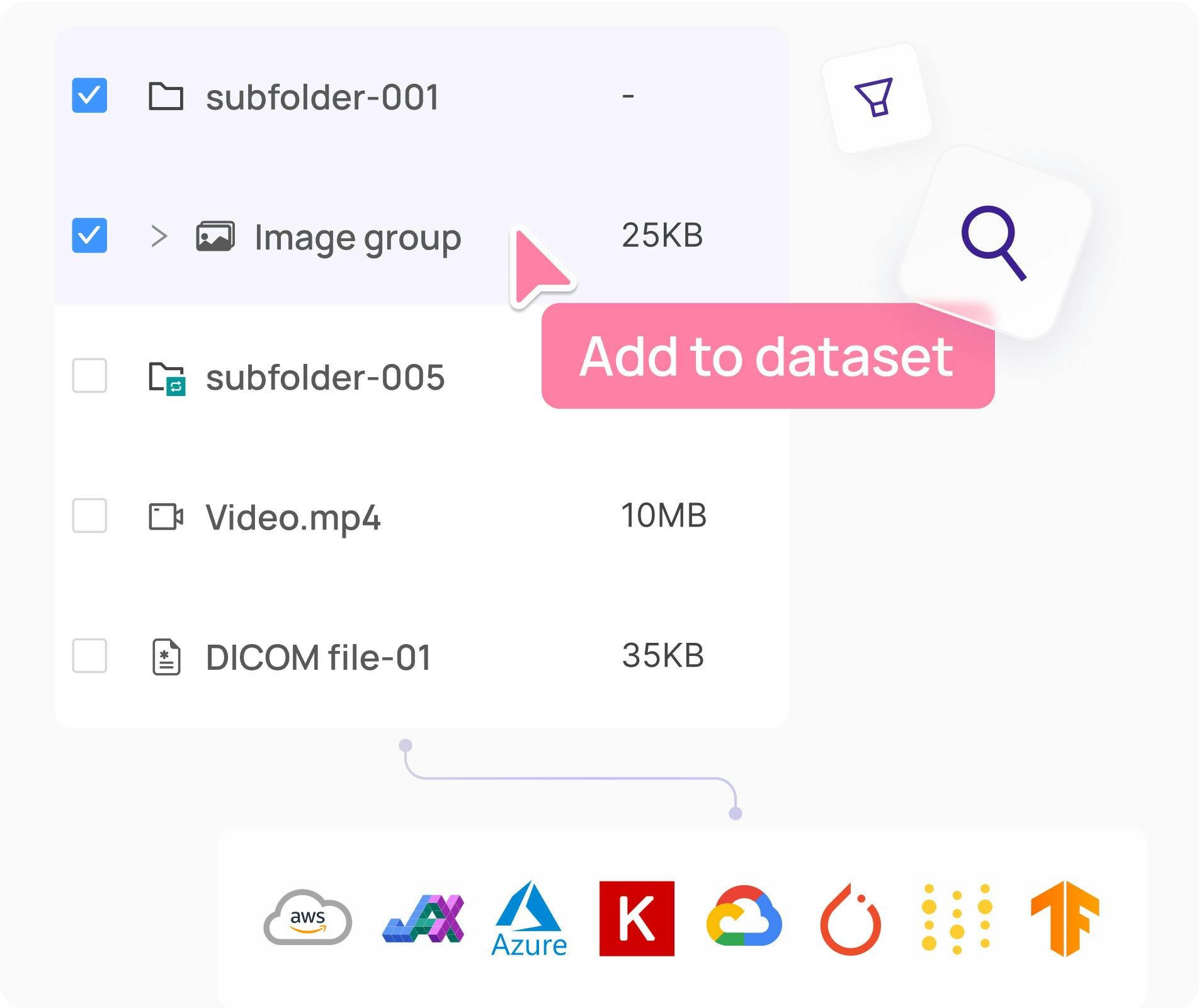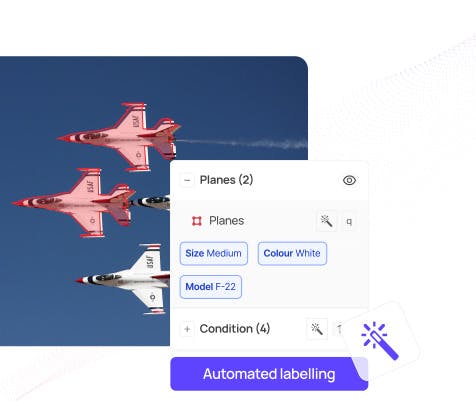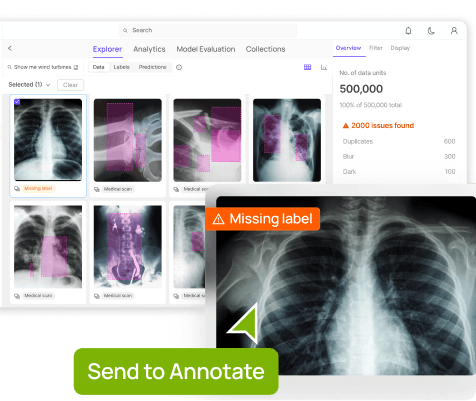Contents
Types of AI as a Service
Benefits and Challenges of AI as a Service
Choosing the Best AIaaS Platform
Popular AI as a Service Providers
Encord
Amazon SageMaker
Google AI
Microsoft Azure AI
IBM Watson
Data Robot
Alibaba Cloud
AI as a Service: Key Takeaways
Encord Blog
AI as a Service: The Ultimate AIaaS Guide for Business in 2025

Almost 80% of companies consider artificial intelligence (AI) the top priority in their strategic decisions. However, the most significant challenges that companies face when implementing AI and machine learning solutions involve measuring AI’s value, skills shortages, and infrastructure incompatibility.
These challenges complicate AI model deployment, as organizations cannot evaluate the long-term monetary benefits, find staff with relevant digital expertise, and raise funds to upgrade infrastructure for seamless integration.
One viable solution is to find appropriate third-party vendors offering cost-effective artificial intelligence as a service (AIaaS) platforms to mitigate these issues. Businesses can significantly benefit from the vendor’s experience in the industry and quickly understand where and when to use AI to remove operational inefficiencies.
In this article, we will discuss the types of AIaaS, their benefits and challenges, and factors to consider when choosing the best AIaaS platform. We will also list the top AIaaS providers in the market.
Types of AI as a Service
Multiple AIaaS platforms offer companies different AI tools to meet their business needs. Categorizing these AI tools according to their type helps determine the most appropriate solution to achieve a particular objective.
Bots
As natural language processing (NLP) and generative AI (Gen AI) algorithms become crucial to organizational success, technology leaders increasingly rely on intelligent bots to automate business operations and enhance the customer experience.
Bots, such as those integrated into platforms like Marlee, are conversational AI software that uses advanced deep learning models to help users perform multiple tasks through a human-like interface. While chatbots are the most common framework, virtual assistants and AI Agents are also emerging as more modern forms of bots. As businesses increasingly turn to AI solutions, key features like Chatbots and AI Agents are improving customer service by effectively handling large volumes of interactions. Services like Allô offer an innovative approach for companies to manage more calls efficiently with their AI-powered business phone systems seamlessly integrated into existing business structures.
The following gives an overview of these three technologies to help understand their differences.
- Chatbots: Chatbots are simple AI-powered programs that use text or voice to understand user queries and generate relevant responses. For instance, chatbots on e-commerce websites provide customer support by helping users find the item they are searching for.
- Virtual Assistants: Virtual assistants use more advanced machine-learning models to understand the surrounding context from text and voice inputs. They offer personalized assistance to help users perform their daily chores. Alexa is an excellent example of a virtual assistant that helps people schedule tasks, set reminders, and manage smart home devices.
- AI Agents: AI Agents are autonomous programs that perform tasks according to user specifications. These tasks can involve monitoring particular metrics and generation recommendations, executing pipelines, and automating operational workflows like sending or responding to emails. Devin, for instance, is an advanced AI software engineer who writes code based on user requirements without manual intervention.
Machine Learning Frameworks
Providers of AI as a service sell multiple solutions to help users quickly build and deploy AI applications. These frameworks have AI functionalities that streamline model development, deployment, and monitoring.
Google Cloud AI is a good example, offering multiple AI services to summarize large documents, deploy ML image processing pipelines, and help create chat apps with retrieval augmented generation (RAG).
Application Programming Interfaces (APIs)
APIs allow users to connect different systems for shared communication and help build an integrated platform to perform specific tasks. AIaaS providers offer APIs that let users create complex end-to-end solutions with AI capabilities that integrate seamlessly with existing tech infrastructure.
The Open AI API is a good example, as it allows users to integrate state-of-the-art generative pre-trained transformer (GPT) models into custom AI applications.
Data Labeling
Data labeling is a crucial process in AI development that involves annotating data points to create accurate, relevant, and consistent datasets to train AI models.
AIaaS platforms offering data labeling services include pre-built models that understand input data to automatically label items and check label quality, speeding up the annotation process.
Popular AI-based data labeling platforms include Encord, LabelBox, and Amazon SageMaker Ground Truth.
Benefits and Challenges of AI as a Service
Like Software-as-a-Service (SaaS), AIaaS allows users to have better accessibility to AI for building complex AI technologies.
But, how to determine if your use case requires AIaaS solution?
One practical way is to understand the benefits and challenges AIaaS involves. Below are the most significant benefits and challenges associated with AIaaS.
Benefits
The primary benefits that AIaaS offers include scalability, productivity gains, enhanced automation, and cost-effectiveness.
Scalability
AIaaS allows users to scale their operations according to demand quickly. It significantly benefits small businesses that can upgrade their AIaaS plans instead of building in-house AI solutions. For example, in the telecom industry, leveraging telecom BSS can further streamline operations, enabling scalable and efficient customer management as demand fluctuates.
For instance, a startup running a chatbot on an e-commerce site can subscribe to higher-tier packages to handle increasing customer queries.
Productivity Gains
AIaaS platforms allow technical staff to identify and resolve issues more efficiently, leading to better decision-making and increased productivity gains.
For instance, AI-based data labeling platforms compute relevant quality metrics that indicate where the issue lies. It helps annotators and reviewers fix labeling errors quickly with minimal effort. AIaaS solutions can also include forecasting models that can predict key performance metrics to allow for more proactive action.
According to McKinsey, combining such AI platforms with other technologies can boost productivity by 3.4 percent annually.
Enhanced Automation
AIaaS lets you quickly automate routine tasks through AI agents and easy-to-use APIs that can seamlessly integrate with your existing AI infrastructure.
For instance, AIaaS platforms can help businesses build real-time pipelines to perform data pre-processing tasks on extensive datasets. The platforms can also flag issues and allow users to focus on finding efficient solutions. By incorporating AI trism, these platforms can offer even more sophisticated data manipulation and analysis capabilities, further optimizing business operations.
Cost Effectiveness
AIaaS is more cost-effective than in-house AI systems as businesses do not have to manage the infrastructure themselves.
For instance, a business wanting to build its proprietary AI solution must bear the costs of staff recruitment and compatible hardware and software while ensuring proper employee training.
In contrast, businesses can quickly integrate AIaaS platforms into their existing system or use cloud computing for more optimal performance. Additionally, AIaaS providers will perform maintenance and upgrade procedures so users can allocate their resources to more relevant tasks.
Challenges
Although AIaaS allows businesses to use cutting-edge technology to optimize workflows, a few issues make choosing the right AIaaS provider challenging.
Data Privacy Issues
AI applications involve a significant amount of sensitive customer data to perform efficiently. However, businesses using AIaaS platforms run the risk of exposing their data sources to the AIaaS provider, who has access to all sensitive information.
Recent reports show that 93% of organizations suffered two or more identity-related breaches in 2023. The situation can lead to data breaches, causing the business to incur heavy losses.
For instance, weak vendor security protocols can lead to data leaks, which can significantly reduce customer confidence and cause a loss of market.
Businesses must verify data privacy procedures and compliance certifications the vendor follows to avoid such incidents.
Vendor Lock-in
Changing vendors can be costly as migrating from one platform to another involves staff retraining, time spent discussing requirements, and possible downtime that disrupts daily business operations. A recent survey shows that around 47% of businesses cited vendor lock-in as a significant concern.
Organizations can avoid vendor lock-in issues by assessing the vendor’s market experience, customer reviews, and commitment to meeting the organization’s strategic goals in the long term.
Less Customizability
AIaaS platforms often lack customization options, as users cannot access the low-level code of AI algorithms. The problem worsens for businesses that operate in dynamic environments and require frequent feature changes and upgrades.
For instance, a business analyzing user reviews may find that a generic sentiment analysis model on an AIaaS platform performs poorly on a customer group in a different geographical location. The reason could be their different language or expressions to provide feedback.
A hybrid approach combining AIaaS models with in-house custom solutions can help mitigate these issues. Constant collaboration with vendors can also help them understand your changing needs.
Skills and Knowledge Gap
Although AIaaS providers manage the backend infrastructure, users still need AI expertise to use the platform to its full potential. However, finding the right talent is challenging as AI technology evolves rapidly.
A survey reports that 48% of tech leaders say the lack of appropriate staff with relevant AI expertise is the most significant roadblock in AI implementation.
A possible solution includes choosing vendors with dedicated support staff who can help users become familiar with all the platform's features. Businesses can also conduct regular training to help build technical acumen as new AI technologies emerge.
Choosing the Best AIaaS Platform
The above-mentioned benefits and challenges give you a reasonable starting point for understanding how to choose a suitable AIaaS platform. However, selecting the best platform can still be overwhelming due to vendors offering multiple solutions.
Below is a brief list of factors you must consider when investing in an AIaaS framework.
- Functionality: Check if the platform contains all the relevant features for your specific use case. For instance, a data labeling solution must have the required labeling methods for the desired modalities.
- Scalability: The platform must be elastic, allowing you to scale up or down quickly depending on the situation.
- Security: The platform must comply with data privacy regulations such as the General Data Protection Regulation (GDPR) and have robust security protocols to avoid data breaches.
- User Experience: Ensure the framework has an easy-to-use interface with clearly labeled options and panels.
- Customer Support: AIaaS vendors must offer adequate customer support to help users quickly learn to use all the platform's features efficiently.
- Integration: Invest in a tool that can easily integrate with existing infrastructure or cloud services with minimal overhead.
- Pricing: The tool’s cost must justify its features. Select a tool that provides quick returns on investment (ROI) and offers flexible packages for businesses of all sizes.
Popular AI as a Service Providers
Considering the above factors, the sections below briefly list the top AIaaS providers to help you select the most suitable option for your business.
The comparison table below also summarizes the extent of each factor in all the platforms for a quick review.

Encord
Encord is an end-to-end AIaaS solution that offers multiple AI-based features to build robust computer vision and multimodal models for large-scale applications. It consists of three components:
- Encord Index: A data management and curation component that lets users organize, visualize, and discover relevant items to build training data.
- Encord Annotate: Offers high-quality labeling tools with automation capabilities using AI Agents to increase accuracy and speed.
- Encord Active: Helps users test and evaluate models based on multiple metrics and intuitive visualizations.
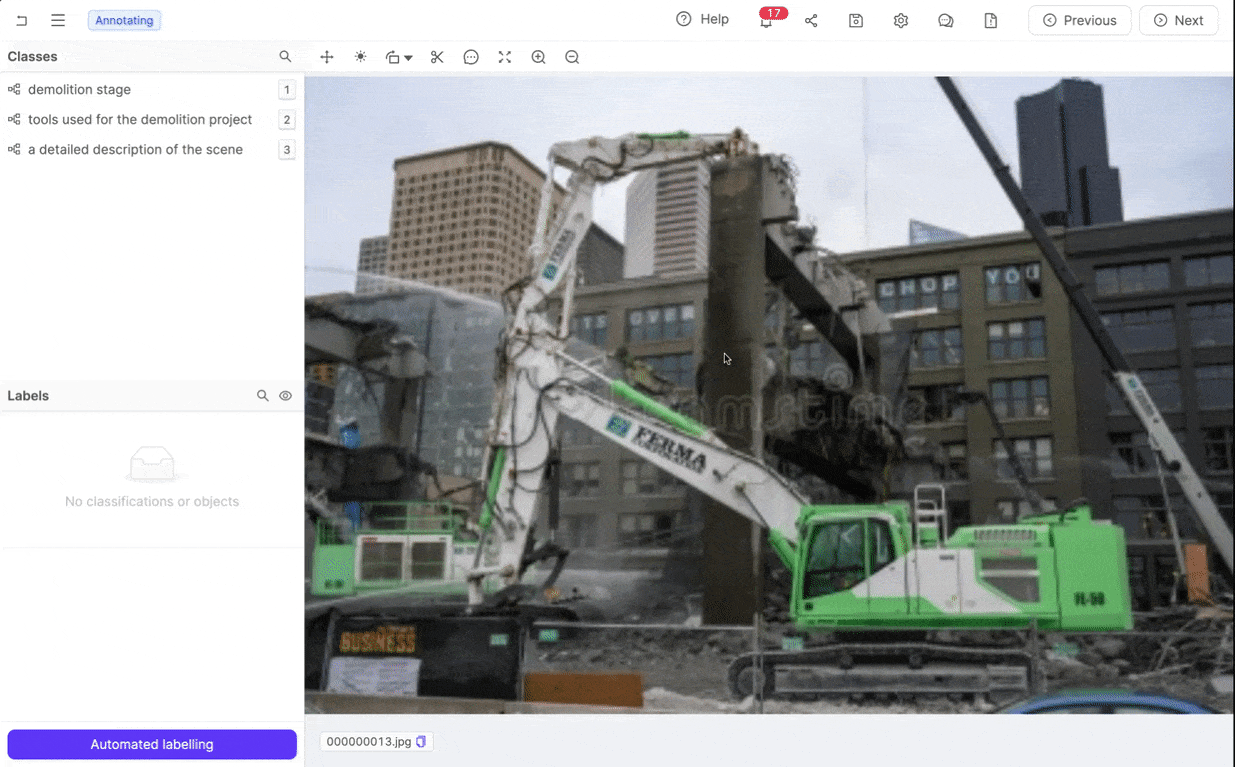
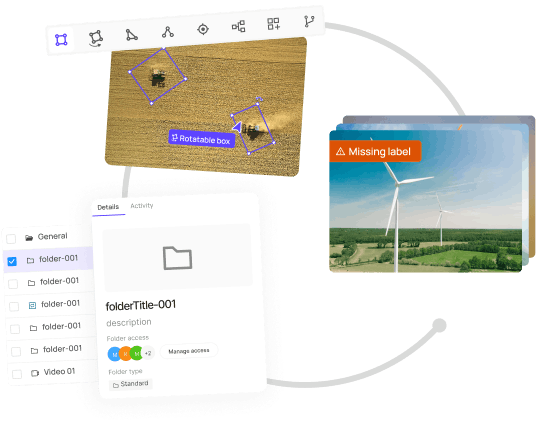
Key Features
- Functionality: Encord offers features to curate and annotate images, videos, and medical data. Bring AI models Gemini Pro, GPT-4o, and Claude 3 to automate annotations with Agents. It also helps evaluate model performance before deployment in production.
- Scalability: The platform allows you to upload up to 5,000 images as a single dataset, create multiple datasets for managing more extensive projects, and upload up to 200,000 frames per video at a time.
- Security: The solution complies with the General Data Protection Regulation (GDPR), System and Organization Controls 2 (SOC 2), and Health Insurance Portability and Accountability Act (HIPAA) standards while using advanced encryption protocols to ensure data privacy.
- User Experience: Encord provides an easy-to-use, no-code interface with self-explanatory options and intuitive dashboards.
- Customer Support: The platform has comprehensive documentation, webinars, and tutorials to help you get started.
- Integration: Encord integrates with mainstream cloud storage platforms, such as AWS, Azure, Google Cloud, and Open Telekom Cloud OSS, to import data for labeling.
Best for
- Teams of all sizes who want to build end-to-end CV applications.
Pricing
- Simple pricing for teams and enterprises as you scale.
Amazon SageMaker
Amazon SageMaker is an AIaaS ML framework that lets you build, train, and deploy ML models for multiple domains. It manages all the backend infrastructure and offers tools to fine-tune multiple open-source models relating to CV, speech recognition, and video analysis.

Key Features
- Functionality: SageMaker consists of advanced data analysis tools for extracting and processing information in documents, detecting fraud in customer transactions, predicting churn, and building recommendation models to improve customer satisfaction.
- Scalability: The platform offers a scalable feature store with 10 million read and write units and 25 GB of storage. It also supports 150,000 seconds of serverless inference duration.
- Security: Amazon SageMaker aligns with AWS’s security compliance controls, which support 143 standards, including GDPR and HIPAA.
Best for
- Large-scale organizations who want to build real-time AI applications for multiple domains.
Pricing
- SageMaker uses an on-demand pricing model.
Google AI
Google AI is Google’s sub-branch dedicated to conducting research and development on advanced AI products and services. Its offerings include Gen AI frameworks that let developers use state-of-the-art Gen AI models and APIs to build scalable applications.

Key Features
- Functionality: Google AI tools to edit images and videos, write emails, generate custom sounds, and offer AI-based dubbing to remove language barriers.
- Scalability: Google’s latest offering includes the Gemini 1.5 large language model (LLM) API. It has a context window of 1 million tokens, allowing users to build scalable applications.
- Customer Support: Google AI offers a 2-3 week AI Readiness Program, during which experts collaborate with users to understand their business needs and offer tailored solutions.
Best for
- Startups wishing to build domain-specific LLM-based applications.
Pricing
- Pricing is not publicly available.
Microsoft Azure AI
Azure AI offers a suite of AI services, including ML development frameworks and APIs for building, training, and deploying AI solutions. It also provides free products for up to 12 months, including Azure virtual machines, an SQL database, and AI models for multiple use cases.

Key Features
- Functionality: Azure AI offers multiple models for moderating content, developing intelligent bots, detecting anomalies in data, and building CV and language applications.
- Security: The Azure ecosystem benefits from Microsoft’s comprehensive privacy policies and complies with EU-U.S., UK Extension, and Swiss-U.S. Data Privacy Frameworks.
- Customer Support: The platform provides multiple resources, including documentation, webinars, training, and certifications, to familiarize users with the Azure framework.
Best for
- Teams who want to build AI models with sensitive data.
Pricing
- Azure AI follows a pay-as-you-go pricing model.
IBM Watson
IBM Watson is a group of AI solutions that allows users to build AI applications using foundation models. It also offers data management and governance solutions to streamline business operations.

Key Features
- Functionality: IBM Watson includes watsonx.ai to train, develop, and validate AI models, watsonx.data for data management, and watsonx.governance for implementing AI workflows that comply with governance protocols.
- Security: IBM Watson uses IBM’s strict privacy policy guidelines for data transfer. It also complies with the EU-US Data Privacy Framework, UK Extension, and Swiss-U.S. Data Privacy Frameworks.
- Customer Support: Users can engage with domain experts for advice on AI model development, data management, and governance frameworks.
Best For
- Teams looking for an end-to-end framework to implement AI and data governance solutions.
Pricing
- IBM Watson has tier-based pricing.
Data Robot
Data Robot is an AIaaS platform for deploying and monitoring predictive and Gen AI models. It offers a unified framework for building, governing, and operating custom AI workflows to suit business requirements.

Key Features
- Functionality: Users can monitor and visualize model performance through real-time alerts, control access and manage AI assets for better compliance, and build customized datasets to fine-tune ML models.
- User Interface: The platform offers an intuitive interface with informative dashboards and visualizations to identify and resolve issues.
- Integration: Data Robot integrates with state-of-the-art frameworks and APIs, such as Hugging Face, LangChain, Open AI, etc. It also integrates with data platforms, including Google Cloud, Azure, and AWS.
Best For
- Teams looking for an easy-to-use deployment and monitoring solution.
Pricing
- Pricing is not publicly available.
Alibaba Cloud
Alibaba Cloud offers a suite of AI services, including AI engineering and data intelligence solutions. Its cloud-based AI platform provides tools for data processing, feature engineering, model prediction, and evaluation.

Key Features
- Functionality: The platform offers powerful data computing tools to process extensive data volumes. It also provides data management, business intelligence, and model development tools to curate big data and extract relevant features to train and validate models.
- Security: Alibaba Cloud services comply with the EU-US Data Privacy Framework, UK Extension, and Swiss-U.S. Data Privacy Frameworks. The platform also complies with global data security standards, including the International Organization for Standardization (ISO) and Standard Occupational Classification (SOC) frameworks.
- Integration: The platform offers flexible data integration, allowing users to synchronize their data between 400 and more data sources.
Best For
- Teams looking for a data and AI solution with business intelligence tools.
Pricing
- Alibaba offers pay-as-you-go and subscription pricing models.
AI as a Service: Key Takeaways
As businesses rush to implement robust AI solutions to remain competitive, the AI as a Service (AIaaS) model is becoming necessary for an organization’s overall strategy.
Below are a few critical points to remember regarding AIaaS.
- AIaaS Types: AIaaS types include bots, ML frameworks, APIs, and data labeling solutions.
- AIaaS Benefits: The most significant benefit of AIaaS is scalability. It allows businesses to upgrade or downgrade their plans flexibly based on requirements.
- AIaaS Challenges: AIaaS vendors can access sensitive data, making data privacy a significant concern. Also, it is challenging to customize AIaaS platforms as the control lies with the AIaaS provider.
- Top AIaaS Vendors: Encord, Amazon SageMaker, and Microsoft Azure are popular AIaaS platforms.
So, establish your competitive edge by getting a suitable AIaaS platform now to boost profitability and sustainability.
Explore the platform
Data infrastructure for multimodal AI
Explore product
Explore our products
AI as a Service (AIaaS) is a cloud-based framework that lets businesses access advanced AI tools without worrying about infrastructure requirements.
The benefits of AIaaS include high scalability, productivity gains, enhanced automation, and cost-effectiveness.
The challenges of AIaaS include data privacy issues, vendor lock-in, less customizability, and skills and knowledge gaps.
The following factors are crucial when choosing an AIaaS platform:
Functionality
Scalability
Security
User Experience
Customer Support
Integration
Pricing
Encord, Amazon SageMaker, and Microsoft Azure AI are the top AIaaS platforms.
Relevant questions include:
How will AIaaS platforms integrate with existing systems?
How difficult is it to learn the features of an AIaaS solution?
Does the AIaaS vendor comply with data security and privacy regulations?
What are the upfront and ongoing costs?
What is the extent of customizability of pre-built AI models in AIaaS platforms?
Common concerns include data security, scalability, cost, performance, and vendor lock-in.
Encord assists teams in overcoming AI integration challenges by providing tailored internal tool sets that enhance collaboration and streamline workflows. Our platform is designed to help organizations navigate the complexities of setting up AI within their pipelines, ensuring smoother transitions and improved outcomes.
Encord provides a streamlined interface that allows customers to directly train AI models using images captured from their robots. The process involves sending images to a server where users can annotate and classify the data, enabling them to customize AI functionalities based on their unique application needs.
Encord differentiates itself by focusing on creating unique value through tailored solutions for AI-driven initiatives. By understanding client needs and providing specialized tools for data annotation, Encord helps organizations achieve superior performance in their machine learning applications.
Encord supports the establishment of an ML Ops system by providing the necessary data management infrastructure and annotation capabilities. The platform is designed to enhance the development of AI models by ensuring that data is easily accessible and well-organized for training and evaluation.
Encord provides a flexible annotation platform that allows businesses to choose the tools and infrastructure that best suit their needs. In a federated model, organizations can leverage Encord to support various AI initiatives while adhering to their specific operational requirements.
Yes, Encord is fully enterprise-ready and designed to meet the needs of companies at the forefront of AI development. Our platform supports a range of enterprise customers, providing the necessary tools and integrations to manage complex AI projects effectively.
Encord is designed to integrate seamlessly with various AI solutions, providing technical support and best practices for platform setup. Our solutions team collaborates closely with customers to ensure they leverage the platform effectively in their projects.
Encord offers a SaaS platform that allows teams to annotate data in-house while also providing access to expert annotators when specialized knowledge is needed. This dual approach helps clients manage their annotation needs efficiently.
